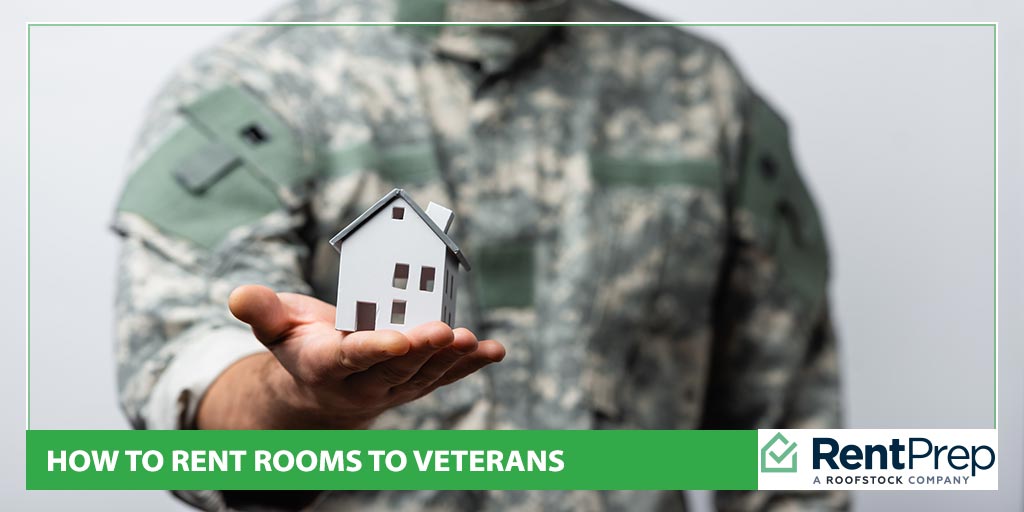
With approximately 18.5 million military veterans across the United States, many face a pressing challenge: homelessness. According to the Department of Veterans Affairs (VA), on a single night in January 2023, 35,574 veterans were without shelter.
Landlords can play a crucial role in addressing this issue by offering their rental properties to veterans. While this act may carry moral and patriotic undertones, it’s also practical. Various programs, such as Veterans Affairs Supportive Housing (VASH) and Supportive Services for Veteran Families (SSVF), offer vouchers and subsidies to assist veterans in securing housing at market rates.
Are you interested in renting to veterans? Our comprehensive guide explores the root causes of veteran homelessness and outlines why landlords should consider renting to veterans as a means of diversifying and stabilizing their income.
We’ll also explore the support programs available to veteran renters, how they function, and the steps to ensure your rental property meets the necessary criteria to become a veteran’s home.
Table Of Contents: Renting To Veterans
Understand the critical issues associated with qualifying to rent to veterans and managing this type of landlord-tenant relationship.
- The Veteran Homelessness Crisis
- Benefits Of Renting To Veterans
- Rent Vouchers And Subsidies For Veterans
- How To Qualify As A Veteran Landlord
- Veteran Rental FAQs
- Landlords Can Help Solve Veteran Homelessness
The Veteran Homelessness Crisis

While veterans often exit the military and use their acquired skills and experience to lead productive civilian lives, many still fall into poverty after service. This may be due to physical disability, mental health issues related to their military service, or a variety of other reasons. As a result, many veterans are low-income renters who struggle to find housing.
First and foremost, this is due to a general lack of affordable housing in the United States. The National Low Income Housing Coalition reports that only 36 affordable rental homes are available for every 100 extremely low-income renter households.
The Department of Veteran Affairs has various voucher and subsidy schemes to help veterans afford the homes available in their area. However, even veterans who have qualified for these programs can still struggle to find housing. Often, this is because some landlords and property managers choose not to accept these program vouchers, even when it means they could charge and collect full market rent.
According to the American Homefront Project, there are two main reasons landlords won’t accept the vouchers.
First, some landlords fear that agreeing to house veterans would subject them to burdensome government programs that would require them to constantly jump through hoops to keep their properties up to code. While there are strict codes governing the condition and quality of veteran housing, they are not more rigorous than any other quality, habitable, accessible housing.
The second reason is a concern that veterans with unresolved mental health and emotional issues might cause damage to property and disrupt rental communities. One landlord gave the example of a veteran potentially waking from a traumatic dream, alarming and scaring neighbors. However, veterans who receive housing support also have access to other types of support to address these kinds of issues. This includes services for post-traumatic stress disorder (PTSD), depression, anxiety, and other needs.
Benefits Of Renting To Veterans
While many landlords remain reluctant to rent to veterans, several potential benefits exist for those who wish to rent to former service personnel.
1. You Can Earn Your Full Rent
Contrary to some misinformation, you do not have to lower your income goals to rent to veterans. While some philanthropic organizations charge veterans lower rent, you can charge your total rent as an independent landlord. The subsidies are designed to help veterans afford the going market rate for rental properties.
2. You Can Have A Secure Source Of Rent
Veterans can represent a highly secure and reliable source of rent for landlords. While rent subsidies usually don’t cover the full cost of rent, the covered portion, usually 50%, is paid directly to the landlord on time each month.
In addition, to maintain their eligibility for rental assistance and other programs, veterans must also pay their portion of the rent on time. Support officers can work with veterans to ensure proper budgeting so that monthly rent money is available.
3. Landlords Get Tenant Management Support
While many landlords worry how veterans’ behavior could affect their property and other tenants, you aren’t on your own when renting to veteran tenants who are on subsidy programs. Each veteran should have a case officer who works with them to ensure they’re meeting their obligations under the rental agreement. The case officer can assist you in managing any issues that might arise with a veteran tenant.
4. You Can Expand Your Market
If your property is in an area where you struggle to find tenants, agreeing to take veterans with vouchers or subsidies can open up a new market. It can be especially fruitful if your property is located near a VA hospital or other support facilities for veterans.
Many veterans are also single people who do not want to live alone. Landlords can optimize their income by renting individual rooms to veterans in single-family homes.
Rent Vouchers And Subsidies For Veterans
 Two main programs, both run by the Department of Veterans Affairs, help veterans afford their rent.
Two main programs, both run by the Department of Veterans Affairs, help veterans afford their rent.
HUD-VASH Vouchers
The Department of Housing and Urban Development (HUD) and the VA run the Supporting Housing Program, known as HUD-VASH.
The program provides veterans with a long-term Housing Choice Voucher (also known as a Section 8 Voucher) that allows them to afford more rental properties in the area.
In addition to financial support, the program provides case management and clinical services. Veterans can sign up through VA medical centers, community-based outreach clinics, and VA contractors.
In some areas, landlords are encouraged to make their properties available to veterans with vouchers. New York has a $1,000 landlord incentive for every apartment with a one-year lease signed by a veteran with a voucher. There is a similar $500 incentive for individual rooms rented to veterans with vouchers with a one-year lease. Also, landlords can also claim up to $3,000 to cover any damage caused by veteran tenants.
The amount of rent covered by the voucher depends on market rates in the area, but the program aims to ensure that veterans are spending no more than 30% of their gross monthly income on rent. In New York, for example, landlords can expect to receive $942 for a single room or $1,256 for a single apartment per voucher as of this writing. The voucher subsidy increases for each additional person in the home if the veteran lives with family members.
SSVF Shallow Subsidy
Supporting Services for Veterans and their Families (SSVF) is a Department of Veteran Affairs program that makes grants to non-profit organizations so they can provide rent subsidies to qualifying veterans.
The form of the subsidy can vary. It can be a fixed amount, such as $500 per month, or a fixed percentage of the rent, usually 30% to 50%. It usually requires signing a lease for a fixed term, such as two years.
To qualify for the program, veterans must demonstrate that they have a continuous and steady income and enough money to pay their portion of the rent. The program should be applied for once the veteran has found a suitable property to rent.
How To Qualify As A Veteran Landlord
To become a veteran landlord, you should register with your local public housing authority. You can do this preemptively or after you have found an eligible tenant.
Once you qualify, you can advertise your property as accepting HUD-VASH and other veteran vouchers and subsidies. You can promote your property specifically among veteran renters by contacting the VA homeless coordinator in your area.
When you find a tenant, the housing authority will screen them to ensure they are eligible for the voucher, and you can also screen the tenant based on your criteria. Learn about RentPrep’s tenant screening services here.
You should also submit the locally specified paperwork for tenancy approval. This is used to determine whether the rent to be charged is in line with other rents in your area. They will also inspect the property to ensure it’s up to code for veteran use.
Once this is done, you and your tenant can sign the lease agreement, which must also be reviewed and approved by the housing department. You’ll also sign a Housing Assistance Payments Contract to ensure you receive your payments.
To be approved, a rental property must be deemed habitable. The code is consistent with what is required for most rental properties. The building should be structurally sound and made from safe materials. There should be a water supply, light and electricity, and heat. Smoke and carbon monoxide detectors should be installed and maintained. There must be adequate sanitary, food preparation, and waste disposal facilities. While these code requirements are universal, other specific ones may vary by location.
You can find detailed information on the requirements here.
Veteran Rental FAQs
Below are answers to some of the most frequently asked landlord questions about renting to veterans.
Are veterans reliable tenants?
Yes, many veterans are very reliable tenants. They often receive a stable income from various sources, such as military retirement, disability benefits, and employment, which can make them financially stable. Additionally, veterans are known for their discipline and respect for rules, qualities that are beneficial in any tenant-landlord relationship.
Can I check a veteran’s service or disability status?
Landlords can request proof of income or employment as part of the application process, which for veterans may include documentation related to military retirement or disability benefits.
However, be cautious and respect privacy and legal boundaries. It’s inappropriate and potentially illegal to inquire about the specifics of a veteran’s disability or to discriminate based on disability status.
Are there any programs to assist veterans with housing?
Yes, there are several programs designed to assist veterans with housing. The U.S. Department of Veterans Affairs (VA) offers the Veterans Affairs Supportive Housing (VASH) program, which combines Housing Choice Voucher (HCV) rental assistance for homeless Veterans with case management and clinical services.
Can I advertise specifically to veterans?
While it’s great to support veterans, landlords need to be careful not to violate the Fair Housing Act, which prohibits discrimination in the sale, rental, and financing of dwellings based on race, color, national origin, religion, sex, familial status, and disability. It’s best to advertise to all potential tenants and let veterans self-identify if they choose.
Landlords Can Help Solve Veteran Homelessness
Veteran homelessness is a significant problem in the United States, and landlords can play an essential role in helping get veterans into safe housing. Offering your rental property to veterans does not mean charging less, as voucher and subsidy schemes help veterans afford to pay market rates.
You can learn more about how to rent to military families here.
Note: RentPrep does not provide tax, legal, or accounting advice. This material has been prepared for informational purposes only and is not intended to provide, and should not be relied on for, tax, legal, or accounting advice. You should consult your own tax, legal, or accounting advisors.

